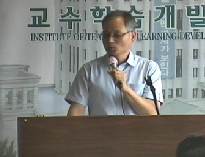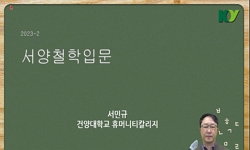지적 직관은 칸트(Kant)가 창조한 개념인 동시에 칸트가 버린 개념이다. 지적 직관의 권능 상실 선포야말로 선험철학의 전모를 함축하고 있는 핵심 사상이라는 것은 주지의 사실이다. 그러나 ...
http://chineseinput.net/에서 pinyin(병음)방식으로 중국어를 변환할 수 있습니다.
변환된 중국어를 복사하여 사용하시면 됩니다.
- 中文 을 입력하시려면 zhongwen을 입력하시고 space를누르시면됩니다.
- 北京 을 입력하시려면 beijing을 입력하시고 space를 누르시면 됩니다.
https://www.riss.kr/link?id=A109683249
-
저자
김형주 (중앙대학교)
- 발행기관
- 학술지명
- 권호사항
-
발행연도
2025
-
작성언어
Korean
-
주제어
지적 직관 ; 칸트 ; 독일관념론 ; 순수이성비판 ; 피히테 ; Intellectual Intuition ; Kant ; German Idealism ; Critique of Pure Reason ; Fichte
-
등재정보
KCI등재
-
자료형태
학술저널
-
수록면
5-30(26쪽)
- 제공처
-
0
상세조회 -
0
다운로드
부가정보
국문 초록 (Abstract)
지적 직관은 칸트(Kant)가 창조한 개념인 동시에 칸트가 버린 개념이다. 지적 직관의 권능 상실 선포야말로 선험철학의 전모를 함축하고 있는 핵심 사상이라는 것은 주지의 사실이다. 그러나 비판철학의 열기가 식고 화점이 분산되기 시작할 무렵부터 이 개념은 곧장 복권한다. 복권의 주체는 피히테를 위시한 비판철학의 후예들이기도 하지만, 실상 칸트 자신이기도 하다는 사실을 밝히는 것이 이 논문이 궁극적으로 밝히고자 하는 바다. 그리고 그 전제는 지적 직관에 대한 적극적 의미는 그의 철학에 상존하고 있다는 것이다. 나는 이러한 배경에서 <순수이성비판>에서 칸트가 지적 직관을 명시적으로 거부한 구절들을 비교, 분석하면서 그것의 적극적 의미의 발굴 가능성을 타진하고자 한다. 그리고 이를 다시 이 구절들에 재투영하여 이를 달리 읽고 적극적으로 해석하고자 한다. 그 과정에서 <순수이성비판> 발간 직전과 이후의 칸트의 언급들을 살펴서 이러한 해석 수행의 지지대로 삼을 것이다. 이를 통해 칸트가 지적 직관의 가능성을 거부하였다고 알려진 그 지점, 즉 <순수이성비판>에서도 역설적으로 그것의 적극적 의미를 발견할 수 있음을 밝히는 것이 이 연구의 직접적인 목표이다.
다국어 초록 (Multilingual Abstract)
Intellectual intuition is both a concept created by Kant and one that he in appearance abandoned. It is a well-known that the proclamation of the deprivation of its authority is a central idea encapsulating the entirety of his transcendental philosoph...
Intellectual intuition is both a concept created by Kant and one that he in appearance abandoned. It is a well-known that the proclamation of the deprivation of its authority is a central idea encapsulating the entirety of his transcendental philosophy. However, as the fervent discusses of critical philosophy waned and its focal points spread out, this concept was soon reinstated. The ultimate aim of this study is to show that while the heirs of critical philosophy, represented by Fichte and particularly the German idealists, are the subjects of this reinstatement, and in fact, Kant himself can also be considered a subject of that. The underlying idea of this argument is that the positive meaning of his concept of intellectual intuition remains truly inherent within his philosophy. Against this background, I will analyze the passages in the Critique of Pure Reason where Kant explicitly rejects intellectual intuition, in order to reveal its positive meaning. will then reproject this meaning onto those very passages, offering an alternative reading art through which a more positive interpretation can be found. In this process, I will also examine Kant’s remarks immediately before and after the publication of the Critique of Pure Reason, using them as a basis for this interpretative attempt. Through this approach, the study directly aims to reveal that even at the very point where Kant is known to have denied the possibility of intellectual intuition—namely, in the Critique of Pure Reason itself—can be discovered paradoxically its positive meaning.
동일학술지(권/호) 다른 논문
-
기술과 종교의 종합, 가치와 규범의 소통: 시몽동의 메타윤리학
- 서양근대철학회
- 장태순
- 2025
- KCI등재
-
- 서양근대철학회
- 이지선
- 2025
- KCI등재
-
- 서양근대철학회
- 황설중
- 2025
- KCI등재
-
- 서양근대철학회
- 곽영윤
- 2025
- KCI등재





 KISS
KISS






